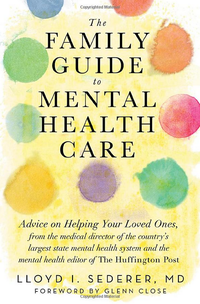Back From The Brink: True Stories and Practical Help for Overcoming Depression and Bipolar Disorder (2013, New Harbinger Publications)
By Graeme Cowan
A book review by Dr. Lloyd Sederer
When you open the cover of this book you first see a copy of a handwritten suicide note, penned by the author in 2004. The PS of the note reads "I just can't be a burden any longer."
Graeme Green's (fourth) attempt on his life came after having endured an unrelenting five years of depression. He had lost his job, his marriage, his family home and was increasingly distanced from his children. The combination of seemingly inescapable psychic pain, a landscape of losses, and the end of hope had made death seem a desirable answer. His note thanked those that stood by him for their "loving care" and pleaded with them to not blame themselves; there was "...nothing possible that you could have done."
People with mental illness have too few examples of those who have recovered and built a life with community, relationships, purpose and pride. Those with serious mental disorders, and addictions, who have built full and gratifying lives may not be visible. They may not broadcast their illness. They may be uncertain about their gains, fearful of stigma, or want to put the past behind them. They, and their families, need to know about others who have recovered, with illness, and built successful and meaningful lives.
Skip over the first section of this book, I think, because it does not give a full enough description to achieve the chapter title ("Understanding Depression and Bipolar Disorder"). That is a tough feat in 18 pages and might have been best left undone or rendered through words of first-hand experience of those affected by these conditions, rather than an attempt to summarize the causes and treatments of mood disorders.
Go right to the interviews with a wide range of people, famous or illustrative, that the author transcribes, which make up the predominance of the book. Cowan asks many great questions that so many people impacted by mental illness have and may not dare to ask, or know whom to ask. "Did you sense that episode coming?" "Were you able to confide in anyone?" "How did your parents' mental health issues impact the family?" "What was it that gave you hope?" "Was rehab helpful?" "When did you get to the point that you felt you needed to ask for help?" "Beyond medication, what else has been helpful?" "What gives you pleasure now?" "Looking back now, do you see any benefits of what you went through?" "If you could go back and give your[self]... advice, what would that be?" And many more questions specific to those portrayed in the book who were brave and put their problems, and solutions, out into the light of day.
Among his diverse group of interviewees are: former U.S. Representative Patrick Kennedy, son of Senator Ted Kennedy, nephew of JFK, and from a dynasty beleaguered by mental and addictive disorders; Trisha Goddard, with a TV and advocacy career in the U.K. and USA; the extraordinary Bob Boorstin, now public policy director at Google and former speechwriter to President Clinton and advisor to U.S. treasury and state secretaries; Jennifer Hentz Moyer who gives us a clear view into postpartum psychosis and depression, and the path back; Alistair Campbell, a key member of Tony Blair's administration for 10 years, from before and during the period that Blair was prime minister of the U.K.; as well as sports figures from tennis and professional football. These are amazing people who built or recovered lives with major mental illness. They show that recovery is possible.
Many common tools for recovery, for a life well lived, emerge from the interviews of this group of individuals. Principal among them are the critical need for support from people who care; good treatment delivered and adhered to over time; finding meaning and purpose through work or other endeavors; self-care with exercise, sleep and a healthy diet; staying away from alcohol and non-prescribed drugs; spiritual belief; and helping others. Those are prescriptions for all of us.
In the U.S., the Depression and Bipolar Support Alliance (DBSA), is an invaluable resource to people with these illnesses, and their families. An Afterword by Allen Doederlein , President of DBSA, nicely tops off this book about illnesses: he writes "...we don't just talk about eradicating illness; we also talk about creating, maintaining and celebrating wellness."
For those searching for evidence of recovery from mental and addictive disorders -- including those affected, their families and friends, and professionals serving them -- you have them in Back From the Brink. Thanks to Graeme Cowan for giving us these stories.
......... Dr. Sederer's new book for families who have a member with a mental illness is The Family Guide to Mental Health Care (Foreword by Glenn Close).
Dr. Sederer's new book for families who have a member with a mental illness is The Family Guide to Mental Health Care (Foreword by Glenn Close).
www.askdrlloyd.com http://www.askdrlloyd.com
The opinions expressed here are solely mine as a psychiatrist and public health advocate. I receive no support from any pharmaceutical or device company.
Copyright Dr. Lloyd Sederer
